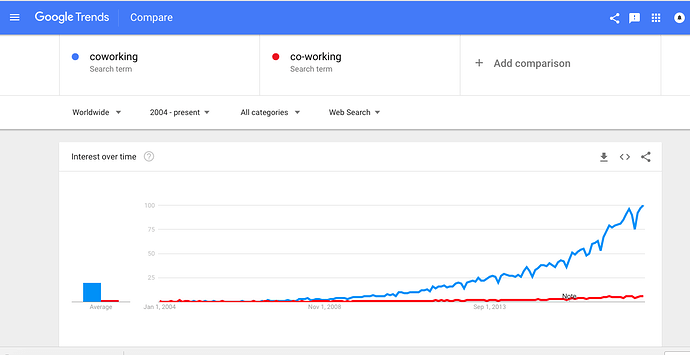Hi All,
I’ve done a little research trying to figure out how we might move forward in trying to persuade the AP to reconsider their position on the co-working vs. coworking issue. Most of what follows is less of a concrete plan, and more of the background info we would need in deciding where/how to focus our efforts:
**1. Webster’s New World College Dictionary (WNWCD) is the official dictionary for the AP Stylebook. **
· Interestingly, and importantly, the WNWCD is not published by Meriam Webster, but by Houghton Mifflin.
· There will be differences, then, between WNWCD’s and Meriam-Webster’s treatment of terms.
· So, if we want to begin by getting coworking into a dictionary, it seems like focusing our attention on the WNWCD would be best.
· BUT…. The AP’s rules of spelling, grammar, etc. don’t always match the WNWCD.
-
For example, the AP spells email without a hyphen, while *WNWCD*’s primary definition retains the hyphen.
· So, if WNWCD adds coworking to their dictionary it wouldn’t necessarily result in a change in the AP’s approach to spelling co-working.
-
Although the AP Stylebooks’s values are listed as consistency, clarity, accuracy, and brevity, they definitely seem to be privileging consistency in their continued use of co-working. (We’ve always spelled it this way and will continue to do so…)
· Finally, the WNWCD just issued its first print revision in decades on August 26. I am guessing that another print edition will not come out for some time. We might lobby for the addition of coworking now, but it would be a while before we saw the change in print.
-
The online version of *WNWCD* probably publishes updates more regularly, but I can’t view their editorial policy without a subscription.
**2. **If we want to argue with the editor(s) at the AP Stylebook directly, we will need a subscription.
· As far as I can tell only subscribers can submit questions to the editor and view the complete archive of past Q and As to the editor.
- A yearly subscription to the AP Style Guide is $26.
**3. **Why does the New York Times use “coworking” when speaking of the Coworking Visa, but not in other cases, as Jacob mentioned in his post?
· Although the New York Times uses the WNWCD, they have their very own style guide that conflicts with the AP’s style guide on many points
**4. **So, what are our options?
· We can work to have coworking included in various dictionaries. This may not impact the AP Stylebook, but it would contribute to making the distinction between co-working and coworking clearer and bring general awareness to the issue.
-
I would be happy to do some research on how different dictionaries treat address the issue of co-working v. coworking if at all, and what the editorial policies are for adding/amending entries.
· Tweet our discontent
-
As Carsten Foertsch suggested in his article for deskmag: @APStylebook #Coworking is not Co-working. It’s an independent movement that doesn’t want to be separated by a hyphen! -
This was suggested in 2011, however, and there hasn’t been much activity since. Do we want to revitalize this? Perhaps come up with a new hashtag? -
Does anyone have other ideas?
Hopefully this info will be useful when deciding what steps to take next!

